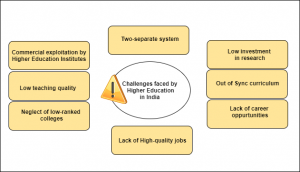[ad_1]
Introduction:
For centuries, from Mahatma Gandhi, B.R. Ambedkar and Jawaharlal Nehru to Amartya Sen and Manmohan Singh, Indians have gone abroad to pursue higher education.
Before the onset of the pandemic, more than 7,50,000 Indian students were studying abroad, spending $24 billion in foreign economies, which is around 1% of India’s GDP.
The number is expected to rise to around 1.8 million by 2024 when our students will be spending nearly $80 billion outside India.
Context:
For decades now, lack of quality education institutes in India and demand-supply gap has been forcing many families to send their children abroad.
The spotlight, however, has turned on these students with two recent events — the Covid-19 pandemic and Russia’s war on Ukraine.
Demand is soaring for various reasons, including the gap in India’s supply of quality education against the demand.
With more than half the Indian population under the age of 25, and no Indian university in the world’s top 100, it is natural that aspirational students would look to study abroad.
Section of Indians shares towards those studying abroad: Large Benefits:
- Sushma Swaraj, as External Affairs Minister, referred to Indians abroad as “brand ambassadors”.
- Prime Minister Narendra Modi and U.K. Prime Minister Boris Johnson call Indians in the U.K. the “living bridge” between both countries.
- We celebrate the achievements of Sundar Pichai and Satya Nadella. Yet, one has to only look at social media or hear some conversations to realise how much contempt a section of Indians shares towards those studying abroad.
- While such opinions do make some noise, the larger benefits in terms of soft power, knowledge transfer and remittances that come back to India render such noise baseless.
- It is estimated that around 20,000 Indian students were stranded in Ukraine.
- To pursue a medical degree, Indian students have been heading out to Russia, China, Ukraine, Kyrgyzstan, Kazakhstan and the Philippines for about three decades now.
- The work of the Union government, complemented by the efforts of some active State governments, is aimed at bringing our fellow citizens back home.
- These efforts are ably supported by embassies in the region, voluntary organisations like NISAU, and other people’s collectives.
- This is the duty of any responsible government and any moral people, and deserves due appreciation.
However, Issues of colleges abruptly closed in other countries:
- What happened in Canada recently is not. Around 2,000 students whose colleges have abruptly closed have been protesting.
- They allege that lakhs of rupees in fees have been taken from them by colleges, which are now bankrupt, thereby jeopardising the students’ futures.
- Something similar happened in the U.K. a few years ago with hundreds of ‘bogus’ colleges being closed, adversely impacting thousands of international students.
- And one can’t forget what happened during the pandemic. Australia shut its borders to the thousands of Indian students enrolled to study on its campuses.
- Even in a country like the U.K., we found ourselves needing to provide food and accommodation to stranded Indians who had lost the economic means to support themselves.
- Contrary to popular opinion, a considerable chunk of students who study abroad are not from wealthy families; they take expensive loans to finance their education.
- The aspiration to secure a better exposure and future can render them prone to difficulties.
- Almost all credible forecasts project that Indian students will continue to go abroad in large numbers for many years to come.
- India is the second largest source of international students after China, and this is expected to continue.
Mandating protection: Proactively create a safety net:
- Given a proper ecosystem, Indian students can significantly contribute to India’s development by transferring advanced knowledge and best practices.
- They are consumers of higher education abroad, and guests of the nations they reside in.
- It is only natural then for us to mandate protection of our people abroad by ensuring that host countries take on this responsibility.
- The Indian government should proactively create a safety net for the international students.
- International agreements that oblige host countries to ensure the welfare of Indian students during times of crises and contingencies should be given paramount importance.
- The trade agreements India is currently negotiating with the U.K. and Australia make for great opportunity to do so.
- A mandatory student insurance scheme as well as responsibility of welfare of students in the foreign country should be incorporated into agreements to secure the interests of students who also spend considerably in the host country.
- For instance, higher education has been one of the strongest exports for the U.K., generating £28.8 billion in revenue.
- Contrary to popular opinion, a considerable chunk of students who study abroad are not from wealthy families.
- They take expensive loans from institutional and non-institutional sources to finance their education.
- The aspiration to secure a better exposure and future can render them prone to difficulties, which can be offset by such a safety net arrangement.
Conclusion:
When the achievement of Indians abroad is ours to celebrate, so is the responsibility to safeguard their welfare.
Enhancing investment in higher education, especially in research and development, is urgently required to raise the standard of higher education in India.
[ad_2]


